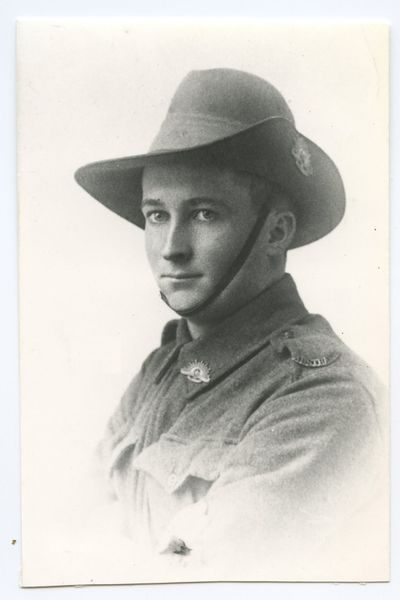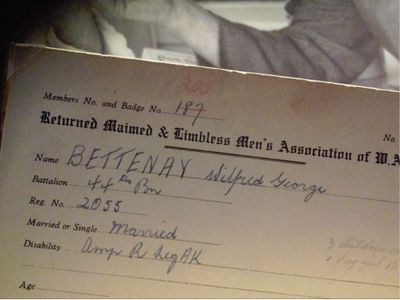Difference between revisions of "Wilfred George Bettenay"
From Our Contribution
| Line 116: | Line 116: | ||
[[Category:Soldier]] | [[Category:Soldier]] | ||
[[Category:1917 WIA]] | [[Category:1917 WIA]] | ||
| + | [[Category:Returned to Australia]] | ||
| + | [[Category:Orchardist]] | ||
| + | [[Category:Congregational]] | ||
Revision as of 13:30, 8 August 2017
 BLSL PH627 | |
 Card on display in Albany's ANZAC Centre | |
| Personal Information | |
|---|---|
| Date of Birth | Not known |
| Place of Birth | Canning Mills, Western Australia |
| Death | 23 Aug 1968 |
| Place of Death | Roleystone, Western Australian |
| Age at Enlistment | 18 years, 11 months |
| Description | 5' 6 ½" (1.69m) tall; 130 lbs (59 Kg) weight; fresh complexion, grey eyes, and dark brown hair |
| Occupation | orchardist |
| Religion | Congregational |
| Address | Karragullen, Western Australia |
| Next of Kin | Father Mr Joseph Bettenay |
| Military Information | |
| Reg Number | 2055 |
| Date of Enlistment | 26 Apr 1916 |
| Rank | Private |
| Unit/Formation | 44th battalion, 3rd reinforcement, C Company |
| Date of Embarkation | 10 Oct 1916 - 2 Dec 1916 |
| Ship Embarked On | HMAT A23 Suffolk |
| Date of Return | 15 Sep 1918 - 10 Nov 1918 |
| Ship Returned On | HMNZT Arawa |
| Fate |
Wounded in Action 4 oct 1917 at Broodseinde Returned ot Australia |
| Monument | Kelmscott |
| Medals |
British War Medal Victory Medal |
War Service
After entering Black Boy Hill camp, Wilfred was allocated to the 16th reinforcement draft for the 28th Battalion, but this was later changed to the 3rd draft for the 44th Battalion before his departure for England.
Although he only arrived in England on the 2nd December 1916, he was quickly shipped off to France on 19 Dec 1916 aboard the HMT Princess Victoria where he eventually joined the 44th Battalion on 23 Mar 1917 in its billets at Pont de Nieppe. Part of the delay was caused by a stay in hospital during December 1916 and January 1917 with German Measles.
On 4 Oct 1917 at Broodseinde Ridge during a major attack on the enemy front line east of Ypres, he received shrapnel wounds to his scalp, hand, and right thigh, the thigh being of greatest concern. Seen initially by the 11th Field Ambulance, he was sent on to the 3rd Australian Casualty Clearing Station, and then the 22nd General Hospital in Amiens. On 16 Oct 1917 he was evacuated on HS Pieter de Connick and transferred to Eastbourne Military Hospital in England.
Nearly six months later (4 Apr 1918) his damaged leg was amputated. It was not until Sep 1918 that he was repatriated to Australia, and then some time passed in No 8 Australian General Hospital at Fremantle before he was discharged by 5th Military District on 8 Mar 1919.
Post War
Wilfred is recorded as having been fit for service and therefore enlisted.[1]
Mr. and Mrs. J. Bettenay, of Irymple, Karragullen, have been notified that their second son, Wilfred, has been wounded.[2]
Wilfred has a Ford wagon, registered number 12611.[3]
1925 - 1968 electoral rolls list Wilfred as living at "Irymple", Karragullen, an orchardist with wife Sidney Mary [nee Gibbings] who he married in 1923. Son Keith Arthur was born on 22 Jun 1924; Dorothy M b. 4 Jan 1926; Elanor M b. 1927; and Phillip J b. 1931.
References
- ↑ "CALL TO ARMS". The Daily News. XXXV, (12,841). Western Australia. 5 April 1916. p. 6 (THIRD EDITION). Retrieved 18 May 2017 – via National Library of Australia.
- ↑ "WAR CASUALTIES.". The West Australian. XXXIII, (4,859). Western Australia. 30 October 1917. p. 5. Retrieved 23 May 2017 – via National Library of Australia.
- ↑ "NEW CARS ON THE ROAD". The Daily News. XLVIII, (16,911). Western Australia. 16 July 1929. p. 9 (HOME FINAL EDITION). Retrieved 23 May 2017 – via National Library of Australia.